 Despite being financially autonomous and not feeling personally discriminated against, Maria Eugénia was sensitive to the “colonial condition” inspired by her political conscience, motivating her to take action in the face of the circumstances of her time, a fact that makes her an unusual woman, not only in that specific era, but in any era that demands rejection of convention and conformism in the face of an unjust social order. Maria Eugénia was not a guerrilla fighter, nor a nurse, nor a political counselor to the nationalist movement.
Despite being financially autonomous and not feeling personally discriminated against, Maria Eugénia was sensitive to the “colonial condition” inspired by her political conscience, motivating her to take action in the face of the circumstances of her time, a fact that makes her an unusual woman, not only in that specific era, but in any era that demands rejection of convention and conformism in the face of an unjust social order. Maria Eugénia was not a guerrilla fighter, nor a nurse, nor a political counselor to the nationalist movement.
I'll visit
10.03.2025 | by Aida Gomes
 For a long time, we treated art as an illustration, the idea that it was a product of its context. But what if we inverted that, since we live in an image civilization, and think of an image as a production, not a product, it produces values, it produces conceptions. And also, when you criticize internally that whiteness classification, we can go through a lot of different questions: who are the people being portrayed? They are, in general, men.
For a long time, we treated art as an illustration, the idea that it was a product of its context. But what if we inverted that, since we live in an image civilization, and think of an image as a production, not a product, it produces values, it produces conceptions. And also, when you criticize internally that whiteness classification, we can go through a lot of different questions: who are the people being portrayed? They are, in general, men.
Face to face
28.03.2024 | by Marta Lança
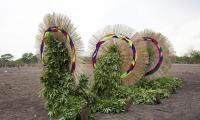 In the contemporary discussions regarding post-colonial Europe, the concepts of memory and post- memory have taken on growing importance, giving prominence to an insight with great political relevance: colonialism never ends with those who enforced or suffered it. Traces of a colonial mindset impregnate generations to come and it has been passed down through the image of the former coloniser and the former colonised. These characters restage a complex phantasmagoria closely related to the most intimate ghost of the European subconscious: its colonial ghost which manifests itself inter alia in the form of a colonial “transfer of memory” – as racism, segregation, exclusion, subalternity – or in the form of “eruptions of memory”, and thereby questions the very essence of European multicultural societies, shaped by colonial heritage and fed by waves of migration.
In the contemporary discussions regarding post-colonial Europe, the concepts of memory and post- memory have taken on growing importance, giving prominence to an insight with great political relevance: colonialism never ends with those who enforced or suffered it. Traces of a colonial mindset impregnate generations to come and it has been passed down through the image of the former coloniser and the former colonised. These characters restage a complex phantasmagoria closely related to the most intimate ghost of the European subconscious: its colonial ghost which manifests itself inter alia in the form of a colonial “transfer of memory” – as racism, segregation, exclusion, subalternity – or in the form of “eruptions of memory”, and thereby questions the very essence of European multicultural societies, shaped by colonial heritage and fed by waves of migration.
To read
31.10.2021 | by Margarida Calafate Ribeiro
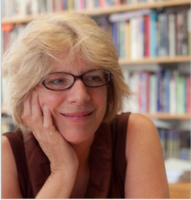 Today, I think that the field is challenged more than ever by the increased volatility of debates about what nations remember and consequentially forget. Monuments and memorials are being vandalized, torn down, officially removed. They can no longer be seen as simply part of an historical landscape. Much of this can be understood as battles over the historical narratives of monuments and their power, but it is also about tensions around who the nation mourns and who it sees or does not see as having a “grievable life” in Judith Butler’s term. So I see memory activism as a key site for the production of memory scholarship.
Today, I think that the field is challenged more than ever by the increased volatility of debates about what nations remember and consequentially forget. Monuments and memorials are being vandalized, torn down, officially removed. They can no longer be seen as simply part of an historical landscape. Much of this can be understood as battles over the historical narratives of monuments and their power, but it is also about tensions around who the nation mourns and who it sees or does not see as having a “grievable life” in Judith Butler’s term. So I see memory activism as a key site for the production of memory scholarship.
Face to face
25.10.2021 | by Inês Beleza Barreiros
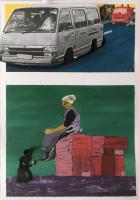 The article by Achille, I think, significantly points out the legitimacy of being limited from obtaining oxygen, by explicitly pointing out that for some parts of the world where healthcare is part of organized neglect, we are faced with more than just the need to physically breathe. There is a prohibition of breathing that is systemic in nature which is part of a larger need for the freedom to breathe (live). For example the violent killings of black civilians by the police in South Africa due to an unchecked implementation of COVID-19 laws and regulations left us questioning the relevance (need) for policing systems embedded in colonial rhetoric.
The article by Achille, I think, significantly points out the legitimacy of being limited from obtaining oxygen, by explicitly pointing out that for some parts of the world where healthcare is part of organized neglect, we are faced with more than just the need to physically breathe. There is a prohibition of breathing that is systemic in nature which is part of a larger need for the freedom to breathe (live). For example the violent killings of black civilians by the police in South Africa due to an unchecked implementation of COVID-19 laws and regulations left us questioning the relevance (need) for policing systems embedded in colonial rhetoric.
Face to face
08.04.2021 | by Marcos Jinguba
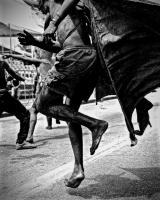 There is a present-day tendency to retreat into the realms of dystopia, of catastrophe and disaster, of failed states and fascism, of environmental collapse and economic apocalypse. This tendency is neither wrong nor mistaken. Yet it is often suffocating, only adding to the pressurized dread of the era, offering no antidote to the plague of cynicism, the chokehold of hopelessness, the drift, or, perhaps, the plunge, into a miasma of pessimism and hopelessness. Of course, there are other tendencies, other possibilities, other ways forward. Here, we briefly mention five recent books, loosely grouped under the banners of anarchism, autonomy, and utopia, that propose better worlds to come – as better must come.
There is a present-day tendency to retreat into the realms of dystopia, of catastrophe and disaster, of failed states and fascism, of environmental collapse and economic apocalypse. This tendency is neither wrong nor mistaken. Yet it is often suffocating, only adding to the pressurized dread of the era, offering no antidote to the plague of cynicism, the chokehold of hopelessness, the drift, or, perhaps, the plunge, into a miasma of pessimism and hopelessness. Of course, there are other tendencies, other possibilities, other ways forward. Here, we briefly mention five recent books, loosely grouped under the banners of anarchism, autonomy, and utopia, that propose better worlds to come – as better must come.
To read
18.03.2021 | by The Public Archive
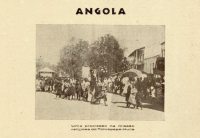 References to Portugal’s epic, seafaring past like these litter this city – there is even a Vasco da Gama shopping mall. But until now, there has never been a single explicit reference, memorial or monument in Portugal’s public space to its pioneering role in the transatlantic slave trade, nor any acknowledgement of the millions of lives that were stolen between the 15th and 19th centuries.
References to Portugal’s epic, seafaring past like these litter this city – there is even a Vasco da Gama shopping mall. But until now, there has never been a single explicit reference, memorial or monument in Portugal’s public space to its pioneering role in the transatlantic slave trade, nor any acknowledgement of the millions of lives that were stolen between the 15th and 19th centuries.
Games Without Borders
15.03.2021 | by Ana Naomi de Sousa
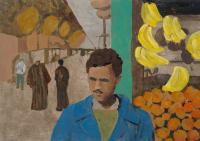 It’s a common place to say that the memory production drags with it, inevitably and concomitantly, the forgetfulness production. There are many ways of forgetfulness, the most insidious of which is, undoubtedly, the memory erasure, the past rewriting as part of a deliberated strategy of intervention in the present.
It’s a common place to say that the memory production drags with it, inevitably and concomitantly, the forgetfulness production. There are many ways of forgetfulness, the most insidious of which is, undoubtedly, the memory erasure, the past rewriting as part of a deliberated strategy of intervention in the present.
Games Without Borders
13.03.2021 | by António Sousa Ribeiro
 Despite the importance of chattel slavery to the making of Portugal and its overseas empire, this terrifying history of black bondage is entirely muted in the public memory of Lisbon. In contrast to the (recently established and far overdue) National Museum of African American History and Culture in the United States or the Museu Afro Brasilin São Paulo, Brazil, there are no such museums or reckoning public memorials in Lisbon along the lines of the Mémorial de l’Abolition d’Esclavage as in Nantes, France. More recently, however, a slavery museum was established in the historic “Mercado de Escravos” (Slave Market) of the southern Portuguese port of Lagos, which is said to be the site of the first trade in enslaved Africans in Europe. Yet, Lisbon remains largely silent on its legacy of white terror and black captivity.
Despite the importance of chattel slavery to the making of Portugal and its overseas empire, this terrifying history of black bondage is entirely muted in the public memory of Lisbon. In contrast to the (recently established and far overdue) National Museum of African American History and Culture in the United States or the Museu Afro Brasilin São Paulo, Brazil, there are no such museums or reckoning public memorials in Lisbon along the lines of the Mémorial de l’Abolition d’Esclavage as in Nantes, France. More recently, however, a slavery museum was established in the historic “Mercado de Escravos” (Slave Market) of the southern Portuguese port of Lagos, which is said to be the site of the first trade in enslaved Africans in Europe. Yet, Lisbon remains largely silent on its legacy of white terror and black captivity.
City
04.02.2021 | by Yesenia Barragan
 AbstractSince this is a matter that is not yet resolved, where the strength of ideologies and re-uses may change deeply or even reverse the ways it is evoked, the colonial past may become a problem (Vecchi, 2018a). This is the case of Portuguese colonialism which is frequently invoked to stress resentments: whether from the country that was colonised or the colonising country (Ferro, 2009). As soon as the Portuguese Revolution of 25 April 1974 took place, Mozambique promoted the elimination of colonialism symbols. This predictable attitude, aiming to show that the colonisation had ended, was later amended by the future Governments, with the colonial stat-ues (at least, the ones that remained) being relocated to a place where they may be observed and contextualised. This action aimed to preserve the memory, which may enable the development of intercultural dynamics, softening the mentioned resentment: promoting questioning, in order to understand certain logics and, at the same time, filling gaps in the forgotten memory and in the Mozambican identity (Khan, Falconi & Krakowska, 2016). This paper refers to the cases related to the new life of two colonial statues in Maputo – Mouzinho de Albuquerque and Salazar –, during the post-colonial period and the permanence, until today, of the first monumental trace of Estado Novo [Second Republic] (Monumento aos Mortos da Primeira Guerra Mundial [World War I monument]), showing the importance that the preservation of memory has in a country or a na-tion’s life, even when it is associated with the former coloniser. This sort of mental decolonisation (Mbembe, 2017; Thiong’o, 1986), aims the questioning of the way the colonial past weighs on the current intercultural relations, in Mozambique, when the country establishes a relation with the former coloniser, allowing its inhabitants to look at the past as a way to build future dynamics.
AbstractSince this is a matter that is not yet resolved, where the strength of ideologies and re-uses may change deeply or even reverse the ways it is evoked, the colonial past may become a problem (Vecchi, 2018a). This is the case of Portuguese colonialism which is frequently invoked to stress resentments: whether from the country that was colonised or the colonising country (Ferro, 2009). As soon as the Portuguese Revolution of 25 April 1974 took place, Mozambique promoted the elimination of colonialism symbols. This predictable attitude, aiming to show that the colonisation had ended, was later amended by the future Governments, with the colonial stat-ues (at least, the ones that remained) being relocated to a place where they may be observed and contextualised. This action aimed to preserve the memory, which may enable the development of intercultural dynamics, softening the mentioned resentment: promoting questioning, in order to understand certain logics and, at the same time, filling gaps in the forgotten memory and in the Mozambican identity (Khan, Falconi & Krakowska, 2016). This paper refers to the cases related to the new life of two colonial statues in Maputo – Mouzinho de Albuquerque and Salazar –, during the post-colonial period and the permanence, until today, of the first monumental trace of Estado Novo [Second Republic] (Monumento aos Mortos da Primeira Guerra Mundial [World War I monument]), showing the importance that the preservation of memory has in a country or a na-tion’s life, even when it is associated with the former coloniser. This sort of mental decolonisation (Mbembe, 2017; Thiong’o, 1986), aims the questioning of the way the colonial past weighs on the current intercultural relations, in Mozambique, when the country establishes a relation with the former coloniser, allowing its inhabitants to look at the past as a way to build future dynamics.
City
13.12.2020 | by Vítor de Sousa
 For Romero, this is one of the points of art: to help us face up to our own part in slavery and its legacy, and a powerful way to reveal, and explore, our past. “With this story, we wanted to tell the British angle – this is British history,” says Romero of The Whip. “We’re in constant dialogue with our past: we have to be.”
For Romero, this is one of the points of art: to help us face up to our own part in slavery and its legacy, and a powerful way to reveal, and explore, our past. “With this story, we wanted to tell the British angle – this is British history,” says Romero of The Whip. “We’re in constant dialogue with our past: we have to be.”
Afroscreen
22.10.2020 | by Holly Williams
 The mission of the EXCHANGE project (2015-2020) (2) is to reflect critically on the perpetuation of the “European dream” of a community of solidarity in which national, linguistic and cultural differences are overcome to produce a space in which citizens can move freely and safely. The surveillance technologies that the project studies have a shared feature: they are genetic machineries that seek to identify individuals for the purposes of criminal prosecution.
The mission of the EXCHANGE project (2015-2020) (2) is to reflect critically on the perpetuation of the “European dream” of a community of solidarity in which national, linguistic and cultural differences are overcome to produce a space in which citizens can move freely and safely. The surveillance technologies that the project studies have a shared feature: they are genetic machineries that seek to identify individuals for the purposes of criminal prosecution.
Games Without Borders
07.09.2019 | by Sheila Khan and Helena Machado
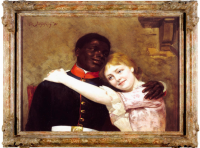 The authors were confronted with the lack of information on the representation of black men and women in European painting, which led them to very direct and immediate questions: who were the people represented? What were the motivations for representing them? And why did black people in European painting rarely have individualized identities?
The authors were confronted with the lack of information on the representation of black men and women in European painting, which led them to very direct and immediate questions: who were the people represented? What were the motivations for representing them? And why did black people in European painting rarely have individualized identities?
To read
10.07.2019 | by Ana Paula Rebelo Correia
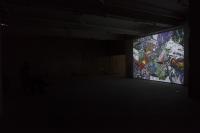 The exhibition Lost Lover speaks about the political, historical and geographical conditions through which knowledge is produced and controlled. The screening program assembled by Lara Koseff was originally presented in Rio de Janeiro, in the courtyard of Lanchonete, now in Rampa, Porto.
In the front room, 11 single-channel video pieces are projected in a loop. The authors, who are mostly from South Africa, confront us with the abandon of fear, thus calling to action topics that are often and strategically silenced.
The exhibition Lost Lover speaks about the political, historical and geographical conditions through which knowledge is produced and controlled. The screening program assembled by Lara Koseff was originally presented in Rio de Janeiro, in the courtyard of Lanchonete, now in Rampa, Porto.
In the front room, 11 single-channel video pieces are projected in a loop. The authors, who are mostly from South Africa, confront us with the abandon of fear, thus calling to action topics that are often and strategically silenced.
I'll visit
12.06.2019 | by Eduarda Neves
 When history and duties to memory are ignored, truth can easily be thought of as a personal choice. Once accommodated in powerful discourse, these “truths” assume impunity: often disregarded and rarely condemned, even though they represent hate speech. Hatred has been normalized and has propelled a radicalism in which “good” struggles against “evil.” In this dichotomy, evil is once again the ‘other’. A discourse that does not humanize the ‘other’ authorizes barbarism – as we have seen in the post-election reactions
When history and duties to memory are ignored, truth can easily be thought of as a personal choice. Once accommodated in powerful discourse, these “truths” assume impunity: often disregarded and rarely condemned, even though they represent hate speech. Hatred has been normalized and has propelled a radicalism in which “good” struggles against “evil.” In this dichotomy, evil is once again the ‘other’. A discourse that does not humanize the ‘other’ authorizes barbarism – as we have seen in the post-election reactions
To read
05.11.2018 | by Fernanda Vilar
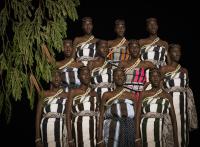 The societies in which we live at different latitudes are legacies of colonialism and constituted by imperial ruins. Depending on our skin colour, social class, academic background and where we live, we can inherit privilege – by benefitting directly or indirectly from the wealth European exploration accumulated – or we can inherit, even accumulate, the oppression of institutional racism and be exposed to inequality and racist colonial violence.
The societies in which we live at different latitudes are legacies of colonialism and constituted by imperial ruins. Depending on our skin colour, social class, academic background and where we live, we can inherit privilege – by benefitting directly or indirectly from the wealth European exploration accumulated – or we can inherit, even accumulate, the oppression of institutional racism and be exposed to inequality and racist colonial violence.
To read
04.11.2018 | by Bruno Sena Martins
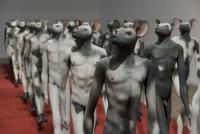 But we can't reverse History, even with the several attempts to naturalize it, to deny it and to manipulate it. Hence the importance of paying attention to the reluctant times we are now living in, which repeatedly insist on following the same old paradigms and refuse to make structural changes.
But we can't reverse History, even with the several attempts to naturalize it, to deny it and to manipulate it. Hence the importance of paying attention to the reluctant times we are now living in, which repeatedly insist on following the same old paradigms and refuse to make structural changes.
To read
22.09.2018 | by Joacine Katar Moreira
 Which colonial or imperial history are we talking about? What do we know about this past, whether distant or recent? What do we really know about such fundamental questions as occupational or income structures in former colonial societies, or patterns of consumption, degrees of literacy, cultural practices, ideological possibilities, levels of political education and participation, or citizenship and land policies, in the city, countryside or in between?
Which colonial or imperial history are we talking about? What do we know about this past, whether distant or recent? What do we really know about such fundamental questions as occupational or income structures in former colonial societies, or patterns of consumption, degrees of literacy, cultural practices, ideological possibilities, levels of political education and participation, or citizenship and land policies, in the city, countryside or in between?
To read
02.06.2018 | by Miguel Bandeira Jerónimo
 Our duty, as creative people, to paraphrase the late Nina Simone, should always be to reflect the times we live in. We do this also by challenging constructions of history that have and continue to favour the powerful as we fight for the future we want to see and experience in the world, beyond our own physical existences.
Our duty, as creative people, to paraphrase the late Nina Simone, should always be to reflect the times we live in. We do this also by challenging constructions of history that have and continue to favour the powerful as we fight for the future we want to see and experience in the world, beyond our own physical existences.
Face to face
31.01.2017 | by Gabi Ngcobo and Katerina Valdivia Bruch
 Despite being financially autonomous and not feeling personally discriminated against, Maria Eugénia was sensitive to the “colonial condition” inspired by her political conscience, motivating her to take action in the face of the circumstances of her time, a fact that makes her an unusual woman, not only in that specific era, but in any era that demands rejection of convention and conformism in the face of an unjust social order. Maria Eugénia was not a guerrilla fighter, nor a nurse, nor a political counselor to the nationalist movement.
Despite being financially autonomous and not feeling personally discriminated against, Maria Eugénia was sensitive to the “colonial condition” inspired by her political conscience, motivating her to take action in the face of the circumstances of her time, a fact that makes her an unusual woman, not only in that specific era, but in any era that demands rejection of convention and conformism in the face of an unjust social order. Maria Eugénia was not a guerrilla fighter, nor a nurse, nor a political counselor to the nationalist movement.  For a long time, we treated art as an illustration, the idea that it was a product of its context. But what if we inverted that, since we live in an image civilization, and think of an image as a production, not a product, it produces values, it produces conceptions. And also, when you criticize internally that whiteness classification, we can go through a lot of different questions: who are the people being portrayed? They are, in general, men.
For a long time, we treated art as an illustration, the idea that it was a product of its context. But what if we inverted that, since we live in an image civilization, and think of an image as a production, not a product, it produces values, it produces conceptions. And also, when you criticize internally that whiteness classification, we can go through a lot of different questions: who are the people being portrayed? They are, in general, men.  In the contemporary discussions regarding post-colonial Europe, the concepts of memory and post- memory have taken on growing importance, giving prominence to an insight with great political relevance: colonialism never ends with those who enforced or suffered it. Traces of a colonial mindset impregnate generations to come and it has been passed down through the image of the former coloniser and the former colonised. These characters restage a complex phantasmagoria closely related to the most intimate ghost of the European subconscious: its colonial ghost which manifests itself inter alia in the form of a colonial “transfer of memory” – as racism, segregation, exclusion, subalternity – or in the form of “eruptions of memory”, and thereby questions the very essence of European multicultural societies, shaped by colonial heritage and fed by waves of migration.
In the contemporary discussions regarding post-colonial Europe, the concepts of memory and post- memory have taken on growing importance, giving prominence to an insight with great political relevance: colonialism never ends with those who enforced or suffered it. Traces of a colonial mindset impregnate generations to come and it has been passed down through the image of the former coloniser and the former colonised. These characters restage a complex phantasmagoria closely related to the most intimate ghost of the European subconscious: its colonial ghost which manifests itself inter alia in the form of a colonial “transfer of memory” – as racism, segregation, exclusion, subalternity – or in the form of “eruptions of memory”, and thereby questions the very essence of European multicultural societies, shaped by colonial heritage and fed by waves of migration.  Today, I think that the field is challenged more than ever by the increased volatility of debates about what nations remember and consequentially forget. Monuments and memorials are being vandalized, torn down, officially removed. They can no longer be seen as simply part of an historical landscape. Much of this can be understood as battles over the historical narratives of monuments and their power, but it is also about tensions around who the nation mourns and who it sees or does not see as having a “grievable life” in Judith Butler’s term. So I see memory activism as a key site for the production of memory scholarship.
Today, I think that the field is challenged more than ever by the increased volatility of debates about what nations remember and consequentially forget. Monuments and memorials are being vandalized, torn down, officially removed. They can no longer be seen as simply part of an historical landscape. Much of this can be understood as battles over the historical narratives of monuments and their power, but it is also about tensions around who the nation mourns and who it sees or does not see as having a “grievable life” in Judith Butler’s term. So I see memory activism as a key site for the production of memory scholarship.  The article by Achille, I think, significantly points out the legitimacy of being limited from obtaining oxygen, by explicitly pointing out that for some parts of the world where healthcare is part of organized neglect, we are faced with more than just the need to physically breathe. There is a prohibition of breathing that is systemic in nature which is part of a larger need for the freedom to breathe (live). For example the violent killings of black civilians by the police in South Africa due to an unchecked implementation of COVID-19 laws and regulations left us questioning the relevance (need) for policing systems embedded in colonial rhetoric.
The article by Achille, I think, significantly points out the legitimacy of being limited from obtaining oxygen, by explicitly pointing out that for some parts of the world where healthcare is part of organized neglect, we are faced with more than just the need to physically breathe. There is a prohibition of breathing that is systemic in nature which is part of a larger need for the freedom to breathe (live). For example the violent killings of black civilians by the police in South Africa due to an unchecked implementation of COVID-19 laws and regulations left us questioning the relevance (need) for policing systems embedded in colonial rhetoric.  There is a present-day tendency to retreat into the realms of dystopia, of catastrophe and disaster, of failed states and fascism, of environmental collapse and economic apocalypse. This tendency is neither wrong nor mistaken. Yet it is often suffocating, only adding to the pressurized dread of the era, offering no antidote to the plague of cynicism, the chokehold of hopelessness, the drift, or, perhaps, the plunge, into a miasma of pessimism and hopelessness. Of course, there are other tendencies, other possibilities, other ways forward. Here, we briefly mention five recent books, loosely grouped under the banners of anarchism, autonomy, and utopia, that propose better worlds to come – as better must come.
There is a present-day tendency to retreat into the realms of dystopia, of catastrophe and disaster, of failed states and fascism, of environmental collapse and economic apocalypse. This tendency is neither wrong nor mistaken. Yet it is often suffocating, only adding to the pressurized dread of the era, offering no antidote to the plague of cynicism, the chokehold of hopelessness, the drift, or, perhaps, the plunge, into a miasma of pessimism and hopelessness. Of course, there are other tendencies, other possibilities, other ways forward. Here, we briefly mention five recent books, loosely grouped under the banners of anarchism, autonomy, and utopia, that propose better worlds to come – as better must come.  References to Portugal’s epic, seafaring past like these litter this city – there is even a Vasco da Gama shopping mall. But until now, there has never been a single explicit reference, memorial or monument in Portugal’s public space to its pioneering role in the transatlantic slave trade, nor any acknowledgement of the millions of lives that were stolen between the 15th and 19th centuries.
References to Portugal’s epic, seafaring past like these litter this city – there is even a Vasco da Gama shopping mall. But until now, there has never been a single explicit reference, memorial or monument in Portugal’s public space to its pioneering role in the transatlantic slave trade, nor any acknowledgement of the millions of lives that were stolen between the 15th and 19th centuries.  It’s a common place to say that the memory production drags with it, inevitably and concomitantly, the forgetfulness production. There are many ways of forgetfulness, the most insidious of which is, undoubtedly, the memory erasure, the past rewriting as part of a deliberated strategy of intervention in the present.
It’s a common place to say that the memory production drags with it, inevitably and concomitantly, the forgetfulness production. There are many ways of forgetfulness, the most insidious of which is, undoubtedly, the memory erasure, the past rewriting as part of a deliberated strategy of intervention in the present.  Despite the importance of chattel slavery to the making of Portugal and its overseas empire, this terrifying history of black bondage is entirely muted in the public memory of Lisbon. In contrast to the (recently established and far overdue) National Museum of African American History and Culture in the United States or the Museu Afro Brasilin São Paulo, Brazil, there are no such museums or reckoning public memorials in Lisbon along the lines of the Mémorial de l’Abolition d’Esclavage as in Nantes, France. More recently, however, a slavery museum was established in the historic “Mercado de Escravos” (Slave Market) of the southern Portuguese port of Lagos, which is said to be the site of the first trade in enslaved Africans in Europe. Yet, Lisbon remains largely silent on its legacy of white terror and black captivity.
Despite the importance of chattel slavery to the making of Portugal and its overseas empire, this terrifying history of black bondage is entirely muted in the public memory of Lisbon. In contrast to the (recently established and far overdue) National Museum of African American History and Culture in the United States or the Museu Afro Brasilin São Paulo, Brazil, there are no such museums or reckoning public memorials in Lisbon along the lines of the Mémorial de l’Abolition d’Esclavage as in Nantes, France. More recently, however, a slavery museum was established in the historic “Mercado de Escravos” (Slave Market) of the southern Portuguese port of Lagos, which is said to be the site of the first trade in enslaved Africans in Europe. Yet, Lisbon remains largely silent on its legacy of white terror and black captivity.  AbstractSince this is a matter that is not yet resolved, where the strength of ideologies and re-uses may change deeply or even reverse the ways it is evoked, the colonial past may become a problem (Vecchi, 2018a). This is the case of Portuguese colonialism which is frequently invoked to stress resentments: whether from the country that was colonised or the colonising country (Ferro, 2009). As soon as the Portuguese Revolution of 25 April 1974 took place, Mozambique promoted the elimination of colonialism symbols. This predictable attitude, aiming to show that the colonisation had ended, was later amended by the future Governments, with the colonial stat-ues (at least, the ones that remained) being relocated to a place where they may be observed and contextualised. This action aimed to preserve the memory, which may enable the development of intercultural dynamics, softening the mentioned resentment: promoting questioning, in order to understand certain logics and, at the same time, filling gaps in the forgotten memory and in the Mozambican identity (Khan, Falconi & Krakowska, 2016). This paper refers to the cases related to the new life of two colonial statues in Maputo – Mouzinho de Albuquerque and Salazar –, during the post-colonial period and the permanence, until today, of the first monumental trace of Estado Novo [Second Republic] (Monumento aos Mortos da Primeira Guerra Mundial [World War I monument]), showing the importance that the preservation of memory has in a country or a na-tion’s life, even when it is associated with the former coloniser. This sort of mental decolonisation (Mbembe, 2017; Thiong’o, 1986), aims the questioning of the way the colonial past weighs on the current intercultural relations, in Mozambique, when the country establishes a relation with the former coloniser, allowing its inhabitants to look at the past as a way to build future dynamics.
AbstractSince this is a matter that is not yet resolved, where the strength of ideologies and re-uses may change deeply or even reverse the ways it is evoked, the colonial past may become a problem (Vecchi, 2018a). This is the case of Portuguese colonialism which is frequently invoked to stress resentments: whether from the country that was colonised or the colonising country (Ferro, 2009). As soon as the Portuguese Revolution of 25 April 1974 took place, Mozambique promoted the elimination of colonialism symbols. This predictable attitude, aiming to show that the colonisation had ended, was later amended by the future Governments, with the colonial stat-ues (at least, the ones that remained) being relocated to a place where they may be observed and contextualised. This action aimed to preserve the memory, which may enable the development of intercultural dynamics, softening the mentioned resentment: promoting questioning, in order to understand certain logics and, at the same time, filling gaps in the forgotten memory and in the Mozambican identity (Khan, Falconi & Krakowska, 2016). This paper refers to the cases related to the new life of two colonial statues in Maputo – Mouzinho de Albuquerque and Salazar –, during the post-colonial period and the permanence, until today, of the first monumental trace of Estado Novo [Second Republic] (Monumento aos Mortos da Primeira Guerra Mundial [World War I monument]), showing the importance that the preservation of memory has in a country or a na-tion’s life, even when it is associated with the former coloniser. This sort of mental decolonisation (Mbembe, 2017; Thiong’o, 1986), aims the questioning of the way the colonial past weighs on the current intercultural relations, in Mozambique, when the country establishes a relation with the former coloniser, allowing its inhabitants to look at the past as a way to build future dynamics.  For Romero, this is one of the points of art: to help us face up to our own part in slavery and its legacy, and a powerful way to reveal, and explore, our past. “With this story, we wanted to tell the British angle – this is British history,” says Romero of The Whip. “We’re in constant dialogue with our past: we have to be.”
For Romero, this is one of the points of art: to help us face up to our own part in slavery and its legacy, and a powerful way to reveal, and explore, our past. “With this story, we wanted to tell the British angle – this is British history,” says Romero of The Whip. “We’re in constant dialogue with our past: we have to be.”  The mission of the EXCHANGE project (2015-2020) (2) is to reflect critically on the perpetuation of the “European dream” of a community of solidarity in which national, linguistic and cultural differences are overcome to produce a space in which citizens can move freely and safely. The surveillance technologies that the project studies have a shared feature: they are genetic machineries that seek to identify individuals for the purposes of criminal prosecution.
The mission of the EXCHANGE project (2015-2020) (2) is to reflect critically on the perpetuation of the “European dream” of a community of solidarity in which national, linguistic and cultural differences are overcome to produce a space in which citizens can move freely and safely. The surveillance technologies that the project studies have a shared feature: they are genetic machineries that seek to identify individuals for the purposes of criminal prosecution.  The authors were confronted with the lack of information on the representation of black men and women in European painting, which led them to very direct and immediate questions: who were the people represented? What were the motivations for representing them? And why did black people in European painting rarely have individualized identities?
The authors were confronted with the lack of information on the representation of black men and women in European painting, which led them to very direct and immediate questions: who were the people represented? What were the motivations for representing them? And why did black people in European painting rarely have individualized identities?  The exhibition Lost Lover speaks about the political, historical and geographical conditions through which knowledge is produced and controlled. The screening program assembled by Lara Koseff was originally presented in Rio de Janeiro, in the courtyard of Lanchonete, now in Rampa, Porto.
In the front room, 11 single-channel video pieces are projected in a loop. The authors, who are mostly from South Africa, confront us with the abandon of fear, thus calling to action topics that are often and strategically silenced.
The exhibition Lost Lover speaks about the political, historical and geographical conditions through which knowledge is produced and controlled. The screening program assembled by Lara Koseff was originally presented in Rio de Janeiro, in the courtyard of Lanchonete, now in Rampa, Porto.
In the front room, 11 single-channel video pieces are projected in a loop. The authors, who are mostly from South Africa, confront us with the abandon of fear, thus calling to action topics that are often and strategically silenced.  When history and duties to memory are ignored, truth can easily be thought of as a personal choice. Once accommodated in powerful discourse, these “truths” assume impunity: often disregarded and rarely condemned, even though they represent hate speech. Hatred has been normalized and has propelled a radicalism in which “good” struggles against “evil.” In this dichotomy, evil is once again the ‘other’. A discourse that does not humanize the ‘other’ authorizes barbarism – as we have seen in the post-election reactions
When history and duties to memory are ignored, truth can easily be thought of as a personal choice. Once accommodated in powerful discourse, these “truths” assume impunity: often disregarded and rarely condemned, even though they represent hate speech. Hatred has been normalized and has propelled a radicalism in which “good” struggles against “evil.” In this dichotomy, evil is once again the ‘other’. A discourse that does not humanize the ‘other’ authorizes barbarism – as we have seen in the post-election reactions  The societies in which we live at different latitudes are legacies of colonialism and constituted by imperial ruins. Depending on our skin colour, social class, academic background and where we live, we can inherit privilege – by benefitting directly or indirectly from the wealth European exploration accumulated – or we can inherit, even accumulate, the oppression of institutional racism and be exposed to inequality and racist colonial violence.
The societies in which we live at different latitudes are legacies of colonialism and constituted by imperial ruins. Depending on our skin colour, social class, academic background and where we live, we can inherit privilege – by benefitting directly or indirectly from the wealth European exploration accumulated – or we can inherit, even accumulate, the oppression of institutional racism and be exposed to inequality and racist colonial violence.  But we can't reverse History, even with the several attempts to naturalize it, to deny it and to manipulate it. Hence the importance of paying attention to the reluctant times we are now living in, which repeatedly insist on following the same old paradigms and refuse to make structural changes.
But we can't reverse History, even with the several attempts to naturalize it, to deny it and to manipulate it. Hence the importance of paying attention to the reluctant times we are now living in, which repeatedly insist on following the same old paradigms and refuse to make structural changes.  Which colonial or imperial history are we talking about? What do we know about this past, whether distant or recent? What do we really know about such fundamental questions as occupational or income structures in former colonial societies, or patterns of consumption, degrees of literacy, cultural practices, ideological possibilities, levels of political education and participation, or citizenship and land policies, in the city, countryside or in between?
Which colonial or imperial history are we talking about? What do we know about this past, whether distant or recent? What do we really know about such fundamental questions as occupational or income structures in former colonial societies, or patterns of consumption, degrees of literacy, cultural practices, ideological possibilities, levels of political education and participation, or citizenship and land policies, in the city, countryside or in between?  Our duty, as creative people, to paraphrase the late Nina Simone, should always be to reflect the times we live in. We do this also by challenging constructions of history that have and continue to favour the powerful as we fight for the future we want to see and experience in the world, beyond our own physical existences.
Our duty, as creative people, to paraphrase the late Nina Simone, should always be to reflect the times we live in. We do this also by challenging constructions of history that have and continue to favour the powerful as we fight for the future we want to see and experience in the world, beyond our own physical existences. 